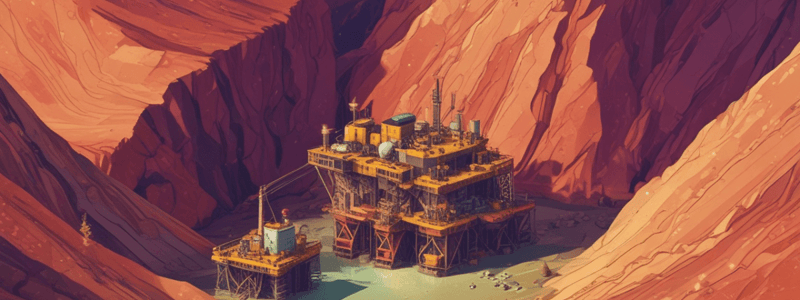Podcast
Questions and Answers
What is the main reason why Rio Tinto's aluminum operations in Quebec have a competitive and environmental advantage over their rivals?
What is the main reason why Rio Tinto's aluminum operations in Quebec have a competitive and environmental advantage over their rivals?
- They have a larger capacity than their rivals
- They have a more modern smelting process
- They have access to cheap and emissions-free hydroelectric power from dams (correct)
- They use coal-based electricity
What is the estimated cost of replacing the Arvida smelter in Saguenay, Quebec?
What is the estimated cost of replacing the Arvida smelter in Saguenay, Quebec?
- US$1.8 billion
- US$2 billion
- US$1.4 billion (correct)
- US$1 billion
What is the expected reduction in carbon emissions per tonne of aluminum with the new smelter?
What is the expected reduction in carbon emissions per tonne of aluminum with the new smelter?
- Unknown (correct)
- 50%
- 90%
- 75%
What is the primary reason for Rio Tinto's slow progress on its plan to produce zero-carbon aluminum?
What is the primary reason for Rio Tinto's slow progress on its plan to produce zero-carbon aluminum?
What is the name of the carbon-free smelting process that Rio Tinto is jointly developing with Alcoa?
What is the name of the carbon-free smelting process that Rio Tinto is jointly developing with Alcoa?
What is the expected capacity of the new smelter compared to Rio Tinto's original promise?
What is the expected capacity of the new smelter compared to Rio Tinto's original promise?
What is the main reason behind the delay in the Elysis project?
What is the main reason behind the delay in the Elysis project?
By when does Rio Tinto expect to achieve emissions abatement across its smelters using the Elysis process?
By when does Rio Tinto expect to achieve emissions abatement across its smelters using the Elysis process?
How much funding did Rio Tinto and Alcoa receive from the federal and Quebec governments for the Elysis project?
How much funding did Rio Tinto and Alcoa receive from the federal and Quebec governments for the Elysis project?
What is the current status of the Elysis project in terms of deployment?
What is the current status of the Elysis project in terms of deployment?
What is the main goal of the Elysis project?
What is the main goal of the Elysis project?
Why are Rio Tinto's customers unhappy with the current aluminum production process?
Why are Rio Tinto's customers unhappy with the current aluminum production process?
What is the expected timeline for the launch of the Elysis demonstration project at Rio Tinto's smelter in Alma, Quebec?
What is the expected timeline for the launch of the Elysis demonstration project at Rio Tinto's smelter in Alma, Quebec?
What is the current status of Rio Tinto's Quebec smelters in terms of carbon emissions?
What is the current status of Rio Tinto's Quebec smelters in terms of carbon emissions?
What is the target year for Rio Tinto to become carbon-neutral?
What is the target year for Rio Tinto to become carbon-neutral?
What is the name of the process that Norsk Hydro ASA is betting on to produce emissions-free aluminum on a commercial scale by 2030?
What is the name of the process that Norsk Hydro ASA is betting on to produce emissions-free aluminum on a commercial scale by 2030?
Flashcards are hidden until you start studying
Study Notes
Rio Tinto's Aluminum Operations
- Rio Tinto acquired Alcan in 2007 and has been slow to fulfill its promises, including its plan to produce zero-carbon aluminum.
Quebec Operations
- Rio Tinto's Quebec aluminum operations, built up by Alcan over 80 years, are among the world's most profitable.
- The eight wholly and jointly owned smelters in Quebec mostly rely on cheap and emissions-free hydroelectric power from dams built by Alcan.
- The additional power bought from Hydro-Québec is sold at a discount to market prices.
Arvida Smelter Replacement
- Rio Tinto announced plans to replace its 98-year-old Arvida smelter in Saguenay, Quebec, with a $1.4-billion facility by 2028.
- The new smelter will generate much less carbon emissions per tonne of aluminum than the old one.
- However, its overall capacity will be barely half of what Rio Tinto promised when it bought Alcan.
Elysis Project
- Rio Tinto and Alcoa are jointly developing the Elysis process, which uses inert anodes instead of carbon anodes during the electrolysis stage.
- The project has been delayed, and Rio Tinto does not expect the new technology to achieve emissions abatement across its smelters before 2030.
- Rio Tinto and Alcoa received $160 million from the federal and Quebec governments to develop the Elysis process.
Challenges and Future
- Rio Tinto's Quebec smelters are still among the province's largest greenhouse-gas emitters, spewing out over three million tonnes of carbon dioxide annually.
- Customers are increasingly unhappy about the carbon footprint of Rio Tinto's smelters.
- Implementing Elysis, if successful, could require the construction of new smelters to meet Rio Tinto's goal of becoming carbon-neutral by 2050.
- Other companies, such as Norway's Norsk Hydro ASA, are also working on zero-carbon techniques and may become competitors to Rio Tinto.
Studying That Suits You
Use AI to generate personalized quizzes and flashcards to suit your learning preferences.




